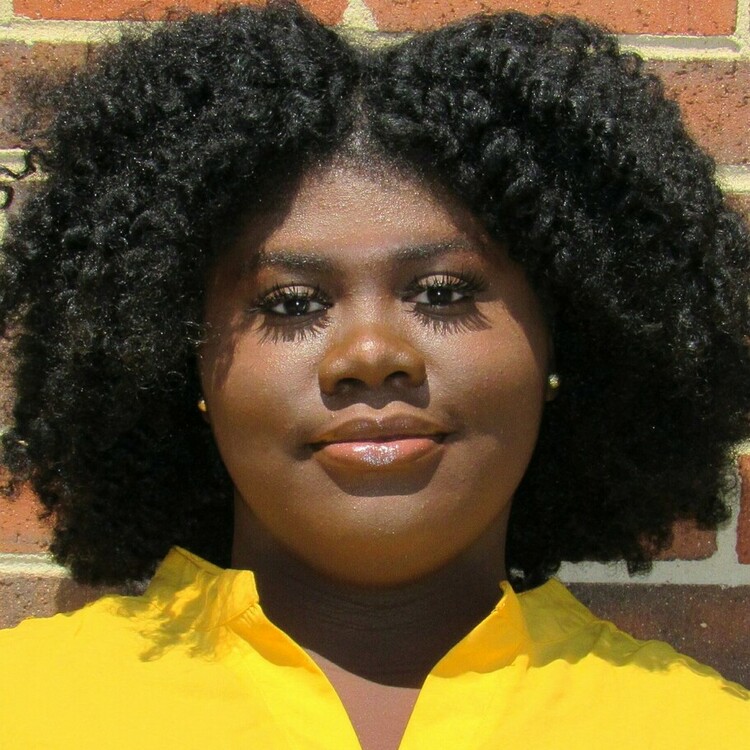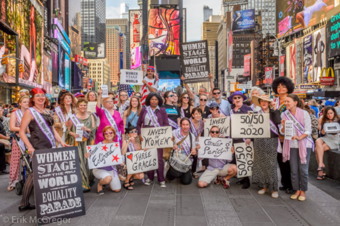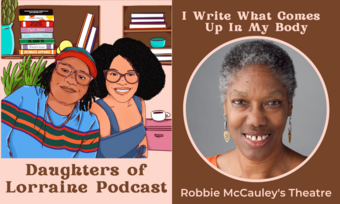What does it mean to be a Black woman? Who gets to tell our stories?
Over the years, there have been plenty of depictions of Black womanhood in the media. Many of these depictions have been of stereotypical recollections of the idea of Black women through the lens of white supremacy, from hypersexualization to mammification. While media such as film and television can entertain the public, live theatre has a way of interacting with society like no other art form can. Theatre is an intervention for the audience and the society they live in. Theatrical performances hold up a mirror and reflect life—life as is or a vision of life as it could be in a better world—which is why it is used as a tool to imagine different ways a society can conduct itself.
Even though over the last ten years there has been an increase in the depiction of Black women as powerful, strong leaders that are capable of enduring anything that comes their way, it comes at a cost. These depictions leave Black women open to the dangers of the strong Black woman trope, which only adds to the burden on our shoulders if we fail. Even while Black characters such as Rose (Fences), Kendra Ellis-Connor (American Son), and Nelly O’Brien (Paradise Square) are thrust into these new ways of thinking about the world, they still have to perpetuate stereotypes. Having the innate sense to nurture those around her while forgetting to include her own needs is a key element in the strong Black woman trope. Other elements include her having to outperform those around her and overcome unfathomable hardships.
Lately, Black men playwrights have been using theatre to try to challenge social constructs and stereotypes, but the remnants of misogynoir are still being displayed in these plays that try to embody progressive ideals. I had one such experience when I was cast in Oedipus the Queen, written and directed by Miller Lucky Jr. Despite the fact that this production was at North Carolina Agricultural and Technical State University (NCAT)—an HBCU (Historically Black College or University)—it still reinforced negative stereotypes of Black women.
In a society that is structured around such ideals, once a Black person is given a “seat at the table” in places they were previously excluded from, everything that one Black person does is considered the standard that everyone else in the Black community should replicate.
Theatre can be used as a powerful tool to educate and better interpret the role each individual holds in society. In my school’s case, Oedipus the Queen could have been used as an educational tool to unpack the problems plaguing the Black community such as colorism; the hypersexualization of Black women and misogyny; and how we could better advocate and reconstruct what is valued in society. Instead, it chose to transport the audience into a fictional world that made commentary of the issues at the audience and not with the audience.
Oedipus the Queen was freely adapted from Oedipus Rex, an ancient myth about a prophecy claiming Oedipus would murder his father and lie with his mother. One thing to note is why this play was so prevalent in society during that time. Augusto Boal detailed in chapter one of Theatre of the Oppressed how the Greek government understood the power that theatre could have on its audience, so they used Aristotelian tragedies to coerce citizens into becoming sovereign subjects that did not stray from the narrow path allotted to them. If they did, they were repeatedly shown the results of the error of their ways—death—under the guise of the tragic hero that they would empathize with throughout the play. In modern America, even though our government may not have a strict hold on theatre and what stories can and cannot be told, white supremacy has been so deeply embedded into our country that the government doesn’t need to pull every string to ensure white supremacist ideals still appear in theatre.
America was created from white supremacist ideology. Pillars that uphold this ideology are racism and sexism. The ideal white supremacist beneficiary is a cishet white man. Black women are the furthest from that. America’s hierarchy deems Black men to be more valuable than Black women because Black men still benefit from the patriarchy. In a society that is structured around such ideals, once a Black person is given a “seat at the table” in places they were previously excluded from, everything that one Black person does is considered the standard that everyone else in the Black community should replicate.
An example of an idolized Black man playwright is August Wilson, “theatre’s poet of Black America,” who notably wrote The Pittsburgh Cycle, which focused on the heritage and experiences of the Black community in different decades of the twentieth century. In the field of theatre, Wilson is considered the main “Black playwright.” This acclamation has led to Wilson’s work being tokenized by those in the field while other Black playwrights are largely ignored. Latching onto one man’s depiction of Black life is harmful because throughout The Pittsburgh Cycle, August Wilson falls short in his representation and use of Black women characters.
In an interview with Sandra Shannon, Wilson was asked how he perceived women’s roles in his work and if he had considered that women have not been the focus of his plays. In response, Wilson said, “No, I am not concerned, and I doubt seriously if I would make a woman the focus of my work simply because of the fact that I am a man, because of the ground on which I stand and the viewpoint from which I perceive the world.” His lack of concern for his Black women characters limits Black women’s place in theatre to subpar characters that are only there for the progression of Black men. But Black women deserve their own agency, too.
White supremacist ideals are an innate component of American society that bleed into fictional characters and stories. These ideals infiltrate the ethics of the playwright and the work produced because the ethics shown throughout the play are still bound by America’s capitalistic society.
Theatre artists who have been influenced by Wilson’s work now have interpretations of Black women’s roles within plays that are dangerous and heavily misguided, such as the playwright of Oedipus the Queen. At NCAT, plays with a mostly Black cast are typically performed because Black people are our main audience demographic. Oedipus the Queen was no exception, as it sought to combat the norms in our society by adapting a well-known classic Greek tragedy into a relatable story the Black community could understand.
Even though Oedipus the Queen was freely adapted from Oedipus Rex, Miller Lucky Jr. decided to add characters that reflected issues within the Black community such as misogyny, colorism, stringent religious values, and sexual violence in a fantastical setting. It fell into the trend of what I call “Wakandafication”: taking glamorized African attributes such as dialect, fashion, music, and visuals from the movie Black Panther and adding it to other works of performance and art. In this play, the main character, Oedipus, exemplified what a Black woman leader needs to be… written through the lens of a Black man, specifically one who was raised in a country that defines Black womanhood Eurocentric beauty standards and fetishizes those with ideals of "Exotic" features: hourglass figure, oiled dark skin, and long hair. These standards dictate what conventional attractiveness is and places Black women at opposition with this by concocting harmful stereotypes about us being hypersexual or inherently aggressive.
In the article “Hyper-Sexualization of Black Women in the Media,” management analyst Annalycia D. Matthews invites readers to recognize how important representation is for Black women: “In this era, we know that the media is a powerful outlet to the world, not just the nation, and has a significant impact on molding the general public to think a certain way. In the media, we see Black women are often shown as ‘sexually willing characters, often inviting of sexual objectification. [These] transcend the confines of the media and penetrate and manifest themselves in everyday society.’”
This is exemplified in the play when the actress who played Oedipus was a dark-skinned Black woman who was molded to fit the modern-day stereotype of what a dark-skinned Black woman has to look like in order to be the leading lady: skintight clothes to accentuate her curvy figure, long hair, and makeup to define her “exotic” aesthetic. This also leads into opposition of the characters that surrounded her, like my character, Senator #2.
For this character, she had to be dark-skinned and show aggression to her male counterparts. Also, a sort of mammification was lent to the role by the playwright in the coddling and protective nature of Senator #2. Due to the play being devised during the rehearsal process, the playwright chose to cast me as Senator #2 not specifically for my talents but for the political capital my body holds as a plus-sized, dark-skinned Black woman. In the middle of callbacks while other auditionees were performing the director came up to me: “They're not doin’ it for me. Read [Senator #2]. When you go up there, I need you to be BOLD. Bring that UMMPH! I know you got it. Understand? Be BOLD. BE BOLD!!!”
Us Black women should not be viewed as one-dimensional facets of stories to sell a fantasy that ends up neglecting and harming us in the reality we live in. We should no longer be your “token Black bitch.”
The political capital of my body was used as a way for the audience to try get a better understanding of people who fit my attributes, but it fell flat due to the metacommentary of my physical appearance being referred to as “foreign” and the lack of depth in my character’s dialogue as she tries to justify her standing in that society. One line spoken to me by another senator character was: “I, for one, don't know your exact origins, clearly, your extra dark complexion suggests that you are an immigrant from somewhere, but wherever it is you ought to go back there and take your two-penny opinion with you.” In response to this, my character is made to defend her citizenship and affirm her position as an official elected officer.
The problem with Oedipus the Queen is that it does not delineate itself from the context of white supremacy. Rather, it just reiterates to its Black audience a view of a world they are all too familiar with. This play’s original intention was to leave the audience with questions that made them reflect on their place in their own communities. Instead of leaving with questions that made them question their complacency with current issues within the Black community, audience members left remembering the wonderful spectacle that was presented to them.
White supremacist ideals are an innate component of American society that bleed into fictional characters and stories. These ideals infiltrate the ethics of the playwright and the work produced because the ethics shown throughout the play are still bound by America’s capitalistic society. Whatever can put butts in seats is deemed good. Even in trying to make good use of the story as an educational component for the Black community, it uplifts ideals ingrained in our society.
Did the views of this figured world transform or flip the audience's perception and lead them to have discussion about our society and the power Black women? Us Black women should not be viewed as one-dimensional facets of stories to sell a fantasy that ends up neglecting and harming us in the reality we live in. We should no longer be your “token Black bitch.” Now that our bodies are in the spaces, do we not have a say? Should we just be grateful and become complacent? No! It’s time to be the changing agent in the theatre community and have these conversations.










Comments
The article is just the start of the conversation—we want to know what you think about this subject, too! HowlRound is a space for knowledge-sharing, and we welcome spirited, thoughtful, and on-topic dialogue. Find our full comments policy here
Thank you for articulating this so clearly Latrice.